Top 6 lessons we learned when moving off the grid and what we would do differently!
If people are serious about moving off the grid, then might as well learn from those who took the leap already. I am not afraid to admit that we learned a LOT when we sold everything and moved out into the country over 10 years ago. If I had to do it again, I would make some changes to save money, work, heart ache, blood, sweat and tears. So if you are interested in this life style, then here are some of the top mistakes we made and what I would do differently.
Build a much smaller earthship
When we started our project we thought that the priority was to build a home. Since we did not know any differently, we built a home the size that most modern homes are built - huge. The earthship is 1500 square feet with a 700 square foot atrium on the front, bringing the total to 2200 square feet. What we found was that building an earthship this big requires a lot of resources, time, energy and work. As a result, it took us two years to get it to the point where we could at least move in, whether it was done or not.
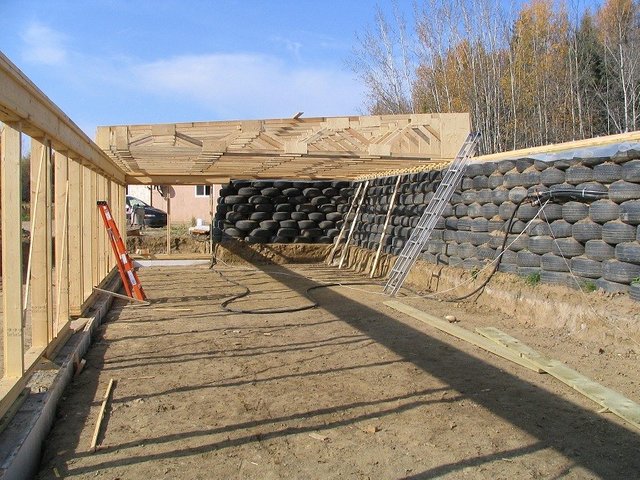
Because it took so long to build, we ended up chewing through a lot of the cash we had to do this project. We had to stop working on the earthship and direct our efforts to other matters which I will discuss below. Our objective was to do this with no line of credit, no mortgage, no debt of any kind. So everything had to be done out of pocket.
What we did not realize was that living off grid is very different than living in the city. When we were in the city we lived in the house. While living off grid we live out side. So the need for a large building did not exist and we could have easily accomplished our goals with an earthship that was around 500 - 800 square feet rather than 2200!
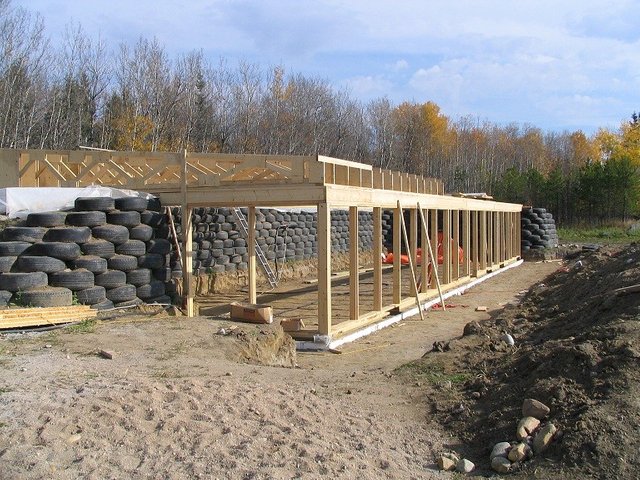
This ended up being a lesson in knowing the difference between needs and wants. So if we were to do this again, our home would be much smaller. That would significantly reduce the capital, time and energy required to get the building done and increase the probability of finishing the building and all the other goals and infrastructure needs. It would also ensure that our capital, which is scarce, would be best utilized for key infrastructure requirements to help us get ourselves established. Because we failed to do that we had to get really creative in acquiring the things we needed to get setup. We learned valuable lessons as a result of this experience and I'm grateful for it!
The tiny house movement will have a significant impact on those who want to move off grid. We built a tiny home and it was a project that can be moved and will easily keep an individual warm during the cold winter nights in the northern climates. It took about 700 hours to build and it finished nicely. That will go a long way towards maintaining a healthy relationship with ones spouse!
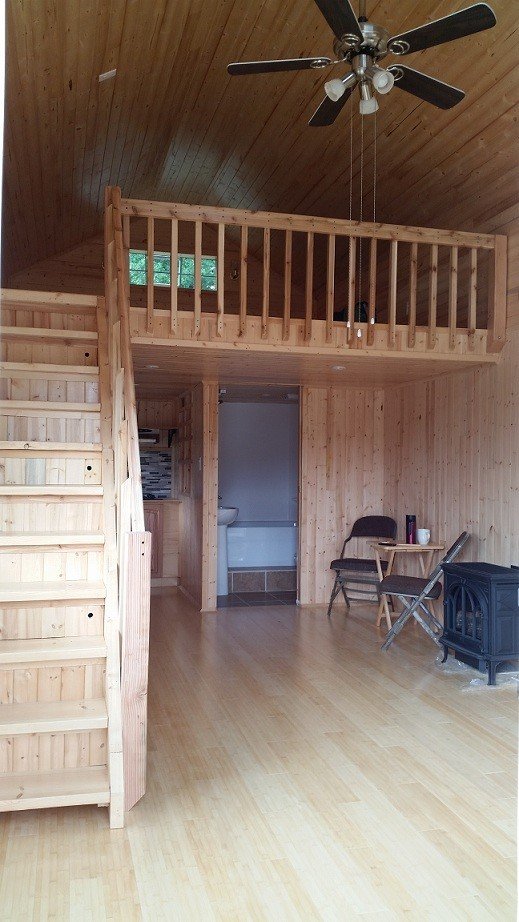
Establish our economy
When we worked on our project we had two earthships to build as we partnered with another family. We worked on their earthship first before working on ours. As a result we were living in the shop for three years before we moved into our home. Through that time we used our capital to pay for our day to day expenses like food. This ended up being a huge mistake as the capital got spent and did not allow us to finish our earthship. We quickly figured out that we were in trouble, so we stopped working on the buildings and started working on gardens and a barn for raising chickens and vegetables so that we can start growing our own food rather than spending capital to by it from the stores.
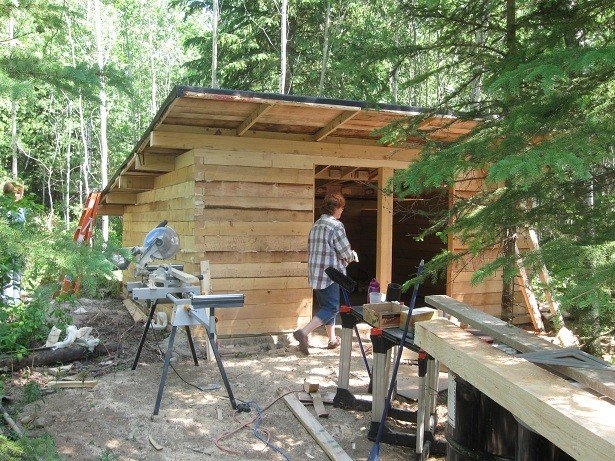
We built a small 15x15 barn to house the chickens and we have also used it for goats as well. We ended up with outside paddocks over time as well, but this simple structure has really helped us keep our live stock safe and warm through the cold winters, which provided us with eggs, milk and meat. If I was to do this again, this would be one of the first projects to do so that we can become as self sufficient as quickly as possible in order to best utilize the capital we had for this project.
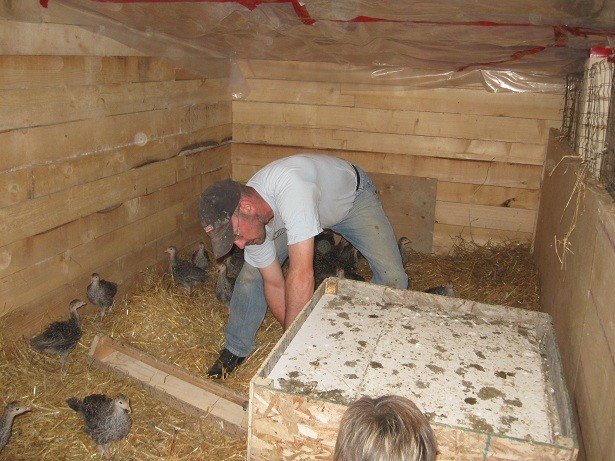
We also realized after a few years that raising animals requires a lot of work, resources and capital. The industrial food system has turned animal products into widgets and can produce them cheaply as a result. That has caused these products to be viewed as inexpensive when in actual fact they are VERY expensive. As a result of this lesson, we drastically cut back on the volumes of animals that we keep and instead ramped up our gardens and greenhouses. With our production more in balance, we find that our gardens produce about 90% of our food and our animals account for about 10%. This is a much healthier and more sustainable ratio for anybody wanting to become self sufficient in food production.
Tool up properly
When I had capital there is a strong desire to purchase what I needed, so purchasing solutions, lumber and other things was direction we took with our project. However, once the capital started running out, that required we get more creative and start making our own solutions rather than purchasing it from the industrial system.
For example, we could have taken the $7000 we spent on lumber for the earthship and used that money to purchase a wood mill. We would have had to mill our own lumber for the earthship, but then we would have a tool to then build the barn, sheds and other infrastructure we needed for our project or help others as well. It would have been more work, but at least we have the raw materials to accomplish that goal and the tools to work with those materials. Other tools like a good wood splitter and wood working tools would have proven beneficial for the project in the long run as well.
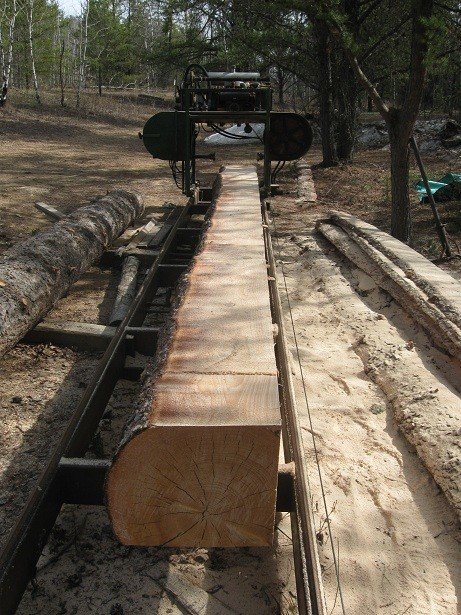
We did get creative and found out that a neighbour had a mill which we used to build the 4x6 timbers for our small barn. But if we had our own, then we would have been much farther along in our project by utilizing our capital properly. Also, don't cheep out on the tools. We purchased a cheep box store chain saw and I was very disappointed in how long it lasted. So I then invested in a high end chain saw and it has not let me down. I would say the same thing about generators too.
Re-purpose, scavenge & get creative
As I hinted above, we used capital to purchase a lot of the materials we thought we needed for the project. Once the capital ran out, we then turned our efforts to being creative and finding alternative solutions to solve the problems we faced. As a result I have learned how to make stuff out of garbage that people throw away or give us. I've made numerous wood stoves out of water pressure tanks found in the dump and have all kinds of materials donated. Whether it is a wood stove heated hot tub, stock water tank that can keep the water from freezing in the winter or a solar food dehydrator all made from garbage, it proves that with some creativity, time and effort, we can make all the things we need with very little capital at all. If I took this approach right from the beginning, I am confident that we would have been able to make our capital stretch for several more years and allowed us to finish our projects.
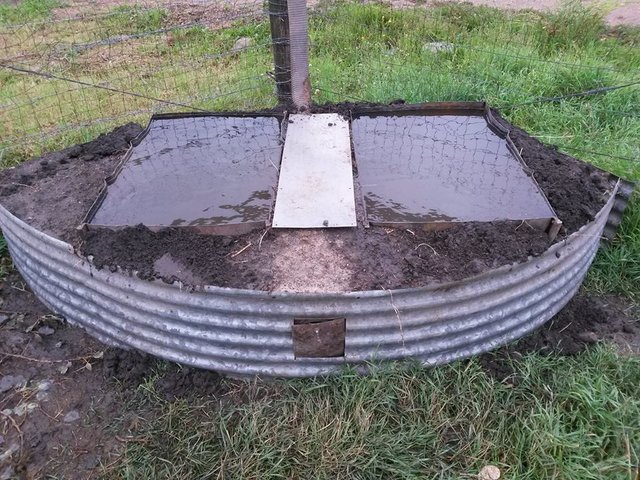
This stock tank was built with 100% recycled materials and will keep the water from freezing during the winter without an electric heating element. There is a small stove under the water and earth that when burned for 5 hours will keep the water thawed for up to three days during -30C weather. Cost: few hours of labour.
Stoves
This may seem strange, but the wood stoves that I purchased when we started this project was not what we needed. A wood cook stove has made the biggest contribution to our independence because it allows us to cook on it and heat the home at the same time. The downside is that the fire box is small so it will not burn all night. However, the barrel stove that I just built does the job way better than any stove I've built or purchased.
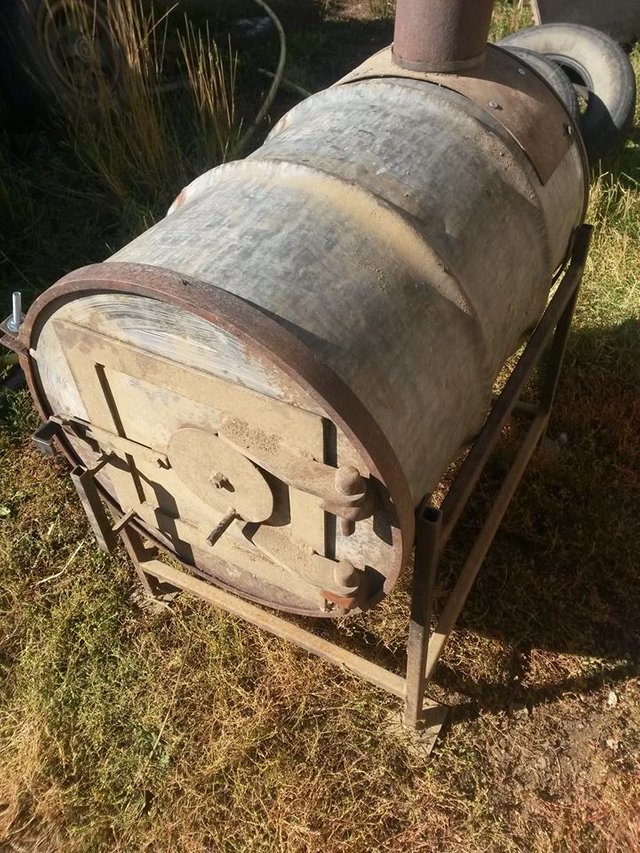
We put this stove in a few weeks ago and I am very surprised at how much heat it produces and it will burn all night long too. I had a good friend give me the parts and I had a heavy steel barrel already, so it only cost me $7 to make this stove. The wood stove we purchased ten years ago cost $2200. So when I contemplate the best bang for the dollar, this home made stove wins hands down. So don't be afraid to play around with solutions like this. Be safe about it and make sure you don't burn your house down. But with the proper research and due diligence, great accomplishments can be had and it is also very rewarding as well.
Needs vs Wants
This topic is by far the biggest lesson for us throughout the last ten years. We quickly realized that our task was to ensure that all our needs were being met and to be discerning to make sure that our wants did not interfere in that goal. When we ran out of capital, this skill was an absolute necessity! Being able to evaluate whether our goal was meeting a need or a want was a huge lesson for us. For many years we just got what ever we wanted, but when living off grid, our wants became secondary as we are now 100% responsible and accountable for our needs. We could not jeopardize a need because of our desire for things that satisfied our wants. To ensure our survival, Carey and I would sit down each morning during our daily planning session and prioritize our tasks ensuring needs were being met. On occasion our wants were satisfied, but they must never jeopardize our needs and that has really helped us make the best of this experience living off the grid. Now that the infrastructure is in place to provide for our needs, we now have the luxury to start working on some of our wants which brings some luxury into our lives. No reason one cannot enjoy luxury while living off grid. Building my hot tub was one of the best feelings in the world!
I'm sure there are lots of other mistakes we made not listed here, but these were the biggest ones. If you have made any mistakes and learned from them, feel free to share so that others can benefit from years of experience, wisdom and life!
I have long lamented that I haven't had the money to start building my tiny house or buy land to put it on, but it's probably better in the long run as in this waiting pattern I have learned a LOT and cut back on dependence on the industrial system, figured out what's really important, and - possibly most importantly - dealt with a lot of my psychological health which isn't to say "I'm totally cured," but I do call myself The Reformed Hoarder. At the rate I had been going in another decade or two I could have been on the show ...which would not have worked well in a tiny house. ;)
I like to think that this journey we are on is for own personal growth, healing and fulfillment. Your post brought warmth to my heart hearing of that growth you have been going through. Either way, I am confident that you will start your project and it will serve you well. I'm excited that people are willing to learn and experience the journey despite the challenges. All that 'stuff' you have, with a lot of creativity, may be all you need to build the infrastructure necessary to meet your physical needs. I have stuff laying around here too, but when ever I need to build something, I go shopping there rather than at the store! If I don't have anything, then I go to the local garbage transfer station. I usually find what I need there. I rarely 'buy' resources any more. The current system throws away so much stuff that I do very well with their garbage. Thank you for sharing. Beautiful testimony.
Glad to see ya here on Steemit :)
Hi Rich! Good to see you here as well! Nice to find facebook friends here. Makes the transition a little easier! Peace to you brother!
Agreed... and back at ya brother.
Thanks for the good read. I particularly like the thought of starting the gardens early on.
Wow, I think everyone has a dream like this in the back of their head to go off the grid and live on their own. Kudos for being ballsy enough to do it, and to share!
Thank you. All of this was actually my wife's idea. Took me a while to get into it, but I'm all in now! Best move we ever made. I've lived more in the last 10 years than I did in the previous 40. Looking forward to another 50 years of learning and experiencing life to the fullest! Peace to you @corganmusic!
We took the leap of faith!
Checking out your other posts, you guys really go into depth! I'd love to see more about the financials behind doing this. What do you do in free time?
I write! lol As for the financials, it all depends. If somebody was really creative at finding materials and resources, one could live off grid with very little capital. We started with lots but it ended up handicapping us as we used the money to buy solutions rather than getting creative ourselves. Our real learning started when the money ran out. We had to find ways to make it work without money. So scavenging, barter and other forms of revenue generation was in order to move the project along. Our Earthship is still not done, but it is coming along.
My mother-in-law joined us and we build a home with a solar system for $40,000. That is with us doing all the labour. I'll talk about that in another post, but the point is, one could get setup for much less than most people think. We built a tiny home with about $10,000 in materials. Homes don't have to cost hundreds of thousands of dollars.
A friend of mine just pointed me at your documentary and I've just started working through your blog posts. I love them and would love to have some land and get off the grid. Though to be honest I don't know if I could go completely off grid like you have. With that said I'm also curious about the financials, especially how you have land and not pay rent(taxes)? Maybe you've already blogged about it and if so I'll get to it as I work through your posts. Thanks again for sharing so we can all learn from you!
I am grateful that you are enjoying the blog posts. I've hinted at financials in other places, but in short, we currently have reduced our dependency on the grid to the point where we only need about $500CDN - $700CDN per month to live very comfortably. That covers phone bill, internet, fuel and the odd item at the store that we cannot grow or make ourselves. Otherwise, we are completely living on the land. I'll cover the other topics in other posts as they require a lot of explaining. <3 Peace to you.
Very good article. I plan to go down that rabbit hole within the next year or so.
Why don't you try using the compost heating method of Jean Pain of France, to pre-heat your household water before boiling/ bathing or keeping your outdoor water ice-free? You can even try burying pipes into a large compost heap or using heated plastic greenhouse air to circulate through with a CPU fan on a thermostat for heating the home.
I also love being creative and thinking out of the box to make things with your own hands. All the best!
I don't use the compost heat mainly because I have about a million items on my to-do list and there are higher priorities at the moment. When living off the grid, our basic needs come first; food, clothing, shelter, etc. As our domain starts to mature and we can play around with luxuries, that may be one project ... one day. I would most likely focus on a hot water envelope for our stove and building solar hot water heating array before I use compost piles for heating water.
I work in the field of home renovation with an interest in owning land with a tiny house. Therefore, I find your introduction, and this post most interesting. I'll definitely keep an eye out for your future postings.
What a powerful article @wwf! And just look at it go, wow, 455 views!! I see it's being shared a TONNE on the internet. I'm beyond happy to see your writing here, and that photo with you and the chickens is sooooooo cute <3 <3 <3
Thank you for sharing your
mistakeslessons with us so we can all grow wiser from them!494 views now. I don't think my posts on Facebook gets this much attention. lol This article has been shared 36 times though, which is almost a record for my writing.
Thank you Lyndsay for the feedback. By the way, those were not chickens but heritage turkeys! lol Still very cute! I really miss that breed. The white turkeys are so difficult to raise that we decided to just raise ducks instead. This is our last year of turkeys. Contemplating my next post. You will have to wait until tomorrow to find out what it is all about! bwahahahahaha
As for the 'mistakes', yes a few friends have called me on using that word. Lessons? For sure. Thank you for confronting me on word usage. I really do appreciate that very much. <3
Oooooh they were so small looking I thought it was a strange breed of chicken. Mmmm turkey...
I'm looking very very forward to your next post(s) <3 <3 <3 <3 <3 <3 So wonderful to see...
Those turkeys were only about 3-4 weeks old, so yes they were small. lol
Fixed! <3
This is awesome. Where I am from, a lot of families live off grid as it is without realising it. Our climate is more friendly so it is really easy to do that. However, it is sad that many are still hustling to get into the type of life you have managed to get out of.
Awesome content. Thanks for sharing.
My wife and I just jumped into building our own home. We realized it's better to pay rent to yourself or buy supplies, because that way it's an investment and not an expense. Thanks for the reminder.
Absolutely! We made a promise that we would do this without a mortgage, line of credit, credit cards or any debt. Everything is done out of pocket. That means no interest charges either. As a result, 100% of our labour goes to us and the family. None of it is being stolen by the banks or others, with the exception of inflation. We tackle that problem by purchasing things right away with the cash we do make. That way we mitigate inflation issues of holding onto money and it deteriorate in purchasing power while we hold on to it. There are times were we have zero cash, but we are still very secure knowing that all our needs are being met. Thanks for sharing. I appreciate that very much.
If you wish to protect long-term savings from inflation there are plenty of cryptocurrencies that gain and hold value better than any fiat.
I'm sure there is. My savings account is wood in the wood shed, food in the freezer or on the shelf, seeds from the plants to re-seed in the spring, knowledge on how to find food and medicine in the bush, how to build shelters, find water and provide for all our needs. That is the true savings. In the end, any currency ends up being useless if we cannot acquire the things we need. cryptocurrencies are also dependent on power, internet, computers and other technology. I trust Mother Earth and Creator more than any man made system. True wealth is not the money in the bank account but the experiences, relationships and memories that we build for we are spiritual beings and when our vessels pass away, that is all we can take with us. That is better than gold, silver or any other physical or fictional construct.
thanks for upvote.
please follow me